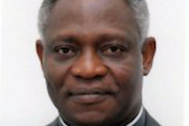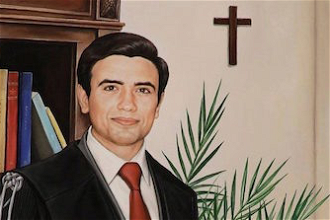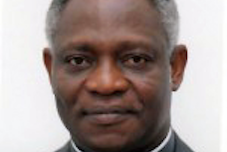Rome: report from International Congress on Rural Llfe

Fr Rob Taylerson attended the International Catholic Rural Association (ICRA) IV World Congress on Rural Life in Rome from 24-27 June 2012. He has sent the following report, entitled: 'Evolution and problems of the rural world facing the challenges of globalization'
A Diversity of Struggles
"So how is agriculture in your country?" I asked the Peruvian Caritas worker who I sat next to at supper on the first evening." It is a semi-arid region," he said, "and because of climate change and El Niño it is becoming much more unpredictable." (El Niño is a rise of Pacific sea temperature, at Christmas time. It affects weather, world droughts and flooding not only in South America but as far afield as Africa and India. Its increased severity and unpredictability are thought to be due to greenhouse gasses and climate change.)
At breakfast the next day I asked the same question to a priest from northern Uganda; "Not good." he said, "Where I live there is much rebel activity, problems with a local war lord who the Americans are trying to kill. The people will be hungry as long as the conflict lasts. They cannot grow food where there is conflict."
At lunch I sat next to a Canadian, a layman who chairs the pastoral council of his home diocese. He is a family farmer from the plains of Saskatchewan. "I've been farming a large, productive family farm for many years." he told me. "I have other jobs as well. The last year in which the family farm made a profit was in 1998". I told him that many family farmers in the UK were in the same position. Despite generally increasing yields, the income from farming, at current prices, in most years will barely cover costs, or will be in deficit.
Later on I asked the same "So how is agriculture in your country?" question to a nun who worked for the Bishops' conference in Ghana. Her eyes filled with tears as she told how often she has visited families with three or four hungry children. Not a scrap of food in the house. "But how is there no food?" I said. "Your country is rich with minerals!" "Yes", she explained," both oil and gold." When I asked where the wealth from this goes, she said, "All to the investors", and explained that only between 3% and 6% of the wealth = generated from minerals is used in any way for the people who live in the country. There is much hunger.
Others told of problems of water and irrigation, of infrastructure breakdown and inability to transport what food there is to market. Industrial pollution continues at a widespread level throughout the world, leaving much land unfit for farming.
Cardinal Turkson told of how in Ghana, his home country, the cyanide used in refining gold often leaches into water courses and poisons animals and humans.
Many countries had experienced different forms of "land grabbing", either by large foreign companies being given mineral rights, or by foreign governments being allowed to take over large tracts of land to grow bio-fuel crops or exported cash crops so that their own economies could achieve "green targets" in carbon footprint international agreements. Finance and economic power problems are common for farmers, with access to credit being tied in to relinquishing control of their own cropping, and often incurring greater financial risk in farming than previously. Some expressed concerns especially about GM (Genetically Modified) crops in this regard.
FAO Insight
Half of Monday, 24 June was spent at the Food and Agriculture Organization (FAO) building. FAO is one of four key bodies of the UN, which represents 192 countries, with a mandate to ensure food for the world's increasing population. FAO personnel's conclusions are that technically the world has the ability to produce 2000 to 3000 calories of food per day per person in the world for the foreseeable future. Problems come mainly because of human greed. Hence over 925 million people go hungry each day and this may well increase.
An excellent paper by Marcela Villarreal of FAO drew attention to world financial speculation of the early years of this century, where major world financial deals were hedged using the world futures grain market. The resulting rapid rising price of grain, especially of rice led to unilateral actions of several countries, which banned rice exports. This exasperated the problem causing huge world price rises, widespread major hunger and world widespread food riots in 2007-2008. Unregulated financial markets, greed, and uncoordinated individual governmental responses, caused much harm. The effects of globalization of capital and its markets are equally central to food availability as is the globalizing of agricultural production and marketing.
In small-scale farming, too, it became clear that micro-credit is a very important tool for survival. The practice of family remittances, where one member of a third world family finds employment in the West and sends remittances to fund family farming development at home, has been a help but is diminishing in the current recession. Migration of male workers has also given women ever- greater responsibility for food production in much of the third world. More women's education and support, and ability to access credit, is needed in many countries.
ICRA Congress Details
The ICRA world congress attracted 150 delegates from approx. 80 countries well spread throughout the world. It comprised three days of talks and discussions. Delegates included bishops, Caritas and other Catholic relief directors and workers, academics, agriculturalists, scientists, economists, social ethicists and others.
Those involved in Catholic Relief and Social Work/Justice and Peace were slightly more numerous than others. ICRA comes under the wing of the Pontifical Council for Justice and Peace, led by Cardinal Turkson. The reflection for part of the congress centred on the rural world in the last 50 years, using "Mater et Magister" and "Caritas in Veritate" as key reference texts for reflection. Social teaching of the Church through these documents was brought to light on many issues.
Introductions, Talks, Reports and Workshops included the following: (ICRA intends to put up much of this content on their website: www.icra-agrimissio.org
Introductions:
by Cardinal Peter Turkson, President of the Pontifical Council for Justice and Peace, welcome by Mr Gianni Alemanno Mayor of Rome and Prof. Mario Catania Minister of Agriculture and Forestry, Introduction by Dr Antonio Inchingoli President, ICRA,
Reports:
"From the 1962 International Congress to Today" Dr Vincenzo Conso Secretary General, ICRA "From Mater et Magistra to Caritas in Veritate: What Development and Engagement for the Christian Community?" Prof Fr Franco Appi Professor of Social Ethics at Pontifical Theological Faculty of Emilia Romagna - Chaplain of ICRA "Catholics and International Engagement in the Rural World: NGOs of Christian Inspiration and their Presence in International Organizations" Mr. Daniel Guéry Former President, Delegate to the Council of Europe, Christian INGOs Coordinator in Strasbourg - MIAMSI
Statements by Representatives of the following continents:
AFRICA: Dr Stephen Kagoro ICRA Vice President for Africa NORTH AMERICA; Mr James Ennis ICRA Vice President for North America SOUTH AMERICA; Dr Fernando Arancibia ICRA Vice President for Latin America ASIA; Ms Rachel V Polestico ICRA Vice President for Asia; AUSTRALIA: Mr Paul O'Callaghan Executive Director of Catholic Social Services in Australia EUROPE; Prof Dominique Vermersch Rector Designated of Université de l'Ouest, France
Workshops
Corporate Farming and the Rural Community ... Coordinator: Dr. Francesca Alfano Economist, Office of the President - Coldiretti - Italy "Caritas in Veritate" and the Agricultural Life ...Coordinator: Mr Juan Humberto Ortíz Roca Executive Secretary of Comisión Episcopal de Acción Social - Peru Education, Culture, Religion in Rural World ...Coordinator: Prof Katherine Marshall Georgetown University - USA Agriculture and Stewardship ... Coordinator: SE Amb Théodore C Loko Ambassador of Benin to the Holy See Climate Change and Agricultural Life ... Coordinator: Fr José Ramón Villarin, SJ President of Ateneo de Manila University - Philippines Food Sovereignty and Access to Food ...Coordinator: H Exc Msgr Frank J Dewane Bishop of Venice and US President NCRLC Economic Justice, Poverty and Rural Life ...Coordinator: Mr. Hippolyt Pul Africa Peace Building Initiatives - CRS Africa Food Security and GMOs ...Coordinator: Dr David Andow University of Minnesota - USA
Some One-Line Thoughts from the Congress
"The Lord's is the Earth and Its Fullness"
Important Catholic perspectives see creation as belonging to God. Keep this awareness centre-stage.
"Enough to Feed, not Enough for Greed" World's resources are limited. Greed in any facet of society may well bring hunger for others.
"Food is a Moral Choice" Unless we grow our own, what we eat affects other's lives, especially in a globalized world.
Fr Rob Taylerson
robtaylerson@hotmail.co.uk


















